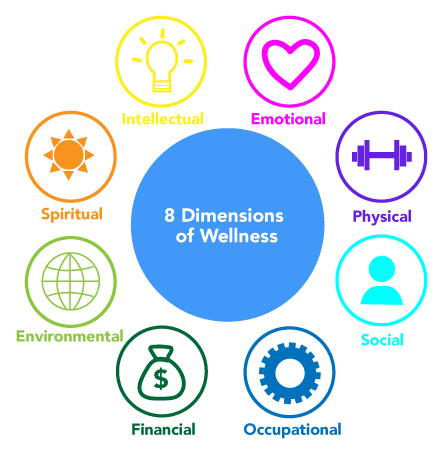8 Dimensions of Wellness

Wellness is defined today in the dimensions of mind, body, and spirit. Included in these dimensions are physical, mental, emotional, sexual, social, and spiritual health. We cannot have total wellness if we ignore any one of these dimensions. Everyone needs to take care of themselves. Sometimes we do not know or understand how interconnected each part of ourselves are. Neglecting any part of one’s self can throw you off balance. Below are some links to guide you through understanding each attribute to stay healthy. Bookmark this page so you can read a little each day on how increase your wellness.
>Physical Wellness
Physical wellness is the overall physical condition of your body. It is related to your body structure or form. It is also related to all other dimensions of health as your body can influence each one.
>Intellectual Wellness
Intellectual Wellness – Seeking to expand knowledge, skills and creative abilities.
>Occupational Wellness
Occupational Wellness – Engaging in work that is meaningful, enjoyable and aligns with personal values.
>Spiritual Wellness
Spiritual Wellness – This dimension is challenging to define, develop and maintain. It is separate from the physical body and has been defined as the “essence” of who you are apart from the body. Another way to look at it is the energy that surrounds your body and that continues when the physical body has died. Energy can be viewed as the essence of your spiritual being. Spirituality is a dynamic state; it can be promoted, its identities and patterns may change, and it can be hidden or invisible. It is difficult to perceive, sense or recognized unless you ignore the outer world and body. Focusing on the essence of yourself as an energy rather than a body can help to make the connection. Spirituality is a general concept and a subjective issue. In this case, spirituality is considered potential (possibilities).
>Environmental Wellness
Environmental Wellness – Resources for you to enhance your school and home lifestyles. Opportunities for student interactions outside of the classroom and complement the academic programs.
>Financial Wellness
Financial Wellness – Making responsible decisions to live within your means and setting financial goals today that will positively impact your financial future.
>Social Wellness
Social Wellness – Can be defined as our ability to interact and form meaningful relationships with others. It also relates to how comfortably we can adapt in social situations. Social relationships have an impact on our emotional, mental health, physical health and mortality risk. Participation in activities that nurtures and deepens the relationships with people in your life can enhance your social health. Examples of activities are brunch, with your friends, going on a date, making time to interact with people you care about.
>Emotional Wellness
Emotional Wellness – Deals with person’s ability to accept and manage feelings through challenge and change. Someone who is emotionally healthy can allow their emotions to be digestible. Good emotional health maintains a feeling of positivity about self and others and the ability to meet the demands of life. Can be related to your physical body as your brain, glands, etc. affect your chemical balances and are a part of the body. Many mental issues are due to physical disorders even though it is often stated “of the mind”. Simple issues, like vitamin deficiency or lack of sleep can cause mentally challenging situations. It affects how we think, feel, and act.